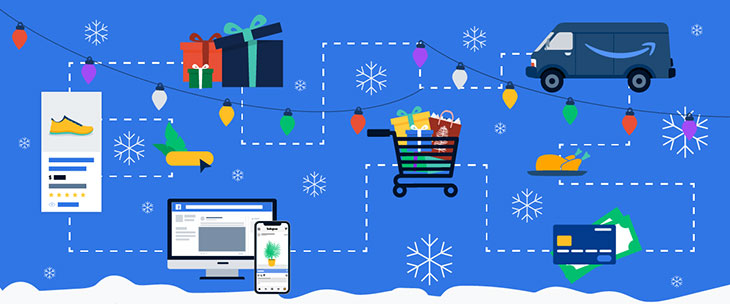The 2020 holiday season was an absolute barn-burner for e-commerce sellers. COVID-19 pushed more consumers online than ever before, resulting in a 49% increase in e-commerce sales over the previous year. Additionally, an infusion of government cash boosted consumer confidence, which helped overall retail sales improve by 3% year-over-year, despite a shaky employment environment. With the 2021 holiday season growing closer by the minute, many online sellers hope we’ll see the same results as last year.
The COVID-19 delta variant has thrown an unexpected wrench into the country’s pandemic recovery, infusing added uncertainty into economic forecasting. However, several factors lead me to believe that we could be in store for a very competitive holiday season. Unlike last year, when the rising e-commerce tide floated every boat, some will likely fare better than others.
A Competitive 2021 Shopping Season
One of the defining features of the 2020 holiday season was Amazon and Walmart’s reduced presence from the paid search marketplace. Heavy demand during the early days of the pandemic had maxed out the infrastructure of these retail giants. As a result, they drastically reduced their paid search efforts and hadn’t fully resumed when the holidays rolled around. The advertisers that remained in paid search saw less competition from the big guys and enjoyed higher volume at a much lower cost-per-click (CPC). Unfortunately, those conditions were short-lived.
Both Amazon and Walmart jumped back into paid search fairly aggressively in April 2021, just as the economy began fully reopening and more people started traveling again for the first time in a year. This realignment led to a 20% drop in e-commerce volume between April and June and a nearly 50% increase in CPCs. These results were surprising for some, who pegged their summer projections on high demand and high volume, leading them to spend more aggressively on advertising and lower their return goals to try and make up for lost volume.
Apple’s new privacy protection features have also complicated the marketing landscape by eroding the effectiveness of Facebook advertising. By some estimates, 40% of the revenue tracked before Apple launched its new features isn’t being tracked now, and cost per thousand (CPM) impressions on the platform are up 60% year-over-year. That means advertisers that succeeded on Facebook before the change probably aren’t seeing the same results now. So, with the holidays approaching, many advertisers may move some of their less effective social advertising dollars to support paid search initiatives.
Holiday Demand Could Be Soft
Ideally, an influx of ad dollars into paid search would be met by increased consumer demand. However, I don’t see that happening this year for a few reasons:
- I expect Amazon, Walmart, and other large big box retailers to remain aggressive, depending on how in-store sales are trending, which could gobble up the majority of existing online traffic.
- It’s unlikely there will be any more stimulus money and pandemic unemployment assistance has ended in most states.
- Delta variant infections could also get much worse as we enter the cold and flu season.
Based on my experience and gut instinct, I believe general holiday spending levels in America will be less than they were last year. Overall, with fewer people searching and fewer people spending, companies shouldn’t expect the results they saw in 2020. Another big variable is whether or not fewer people will be visiting retail stores — this particular trend is currently up year-over-year, so we may see businesses encourage in-store shopping on days like Black Friday. However, in-store shopping pushes will likely be determined on a state-by-state basis depending on local COVID-19 infections and trends.
Strategies to Succeed During a Competitive Season
Taken together, skyrocketing competition and softening demand are creating a potential powder keg of advertising dollars in the paid search space. As companies spend feverishly in pursuit of less volume, to be successful they’ll need to have a plan in place and be prepared to be flexible as they face an unprecedented holiday shopping season. With that in mind, here are a few things online sellers should consider as they prepare their 2021 holiday strategies.
Start Fostering Customer Lifetime Value
In an environment where obtaining new customers is more expensive, online sellers will benefit by nurturing the customers they already have. After all, if someone’s already successfully purchased a product once, they’ll be much more likely to buy a second time. Email and loyalty programs are critical for engaging returning customers and are much more cost-effective than new customer acquisition campaigns.
Change Your Goals
Most business owners look at their advertising channels as profit drivers rather than new customer drivers. Measurements like return on ad spend (ROAS) reinforce this idea by showing how much money advertisers earn for every dollar they spend. But, in an era when the cost of marketing may be rising due to increased competition, it’s more effective to use Google for new customer acquisitions and then target those new customers again and again with more cost-effective email and loyalty programs.
As long as online sellers gain new customers and build lifetime value, they don’t need to worry about falling ROAS statistics. Even if the first order isn’t profitable, all the subsequent orders should be.
Find New Places to Push Product Through
If Amazon and Google search volumes decline this year, and Facebook CPMs remain high, sellers should look for new avenues to market their products. Walmart is a great option, but it takes time to get new products uploaded and approved. Wish is also very aggressive in courting legitimate brands and could be an exciting new player in e‑commerce. Regardless of the avenue, it’s critical to make these moves now, as it takes time to get products and advertising strategies solidified on new platforms. Also, if sellers aren’t already advertising on core platforms like Microsoft and Instagram, it’s important they move there this year.
Include a Buy Now/Pay Later Option
With a simple code snippet, online sellers can now allow customers to make purchases with monthly payments rather than paying for the total cost of the product upfront. This strategy works well for higher-ticket items and could be the incentive on-the-fence customers need to make a purchase decision. These payment options can impact tracking because they typically take users offsite, so it’s critical that analytics platforms correctly identify the source of buy now/pay later traffic.
Leverage Promotions
This holiday season, major search engines expect that the U.S. market will be heavily motivated by promotions or sales. In response, Google recently announced that they’re rolling out new features to make promotions and sales more visible on their platform. Consumers can now find a section titled “Deals related to your search” in the Shopping tab, which highlights deals and promotions around the web. In October, Google will also launch a new carousel for special retail events that features relevant deals and sales information. Finally, Google revealed that promotions uploaded via the Google Merchant Center will be automatically shown to users on the Shopping tab, even if the retailer isn’t running Google ads. By preparing a few special holiday promotions, online sellers can take advantage of these new opportunities and stand out just a little more against the competition.
Be Prepared to Be Flexible
Every online seller will develop a plan of attack for the holiday season, and almost every one of these plans may need to be adjusted for one reason or another. That’s why businesses must read the information coming in and be prepared to shift their goals and strategies when something’s not working or double-down on a successful strategy. Otherwise, they’ll continue spending hard-earned advertising dollars in vain.
Set Yourself Up for Future Success
While making predictions during a pandemic is challenging, all signs point toward a very competitive holiday season, where advertisers spend more money pursuing less traffic. However, with a change of perspective, a focus on fostering lifetime value and a bit of flexibility, businesses can use a competitive holiday season to set up even greater success in 2022.



